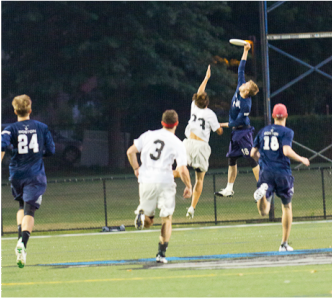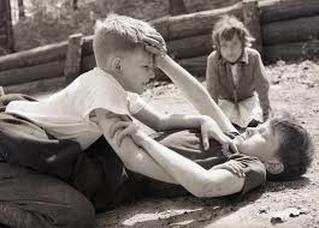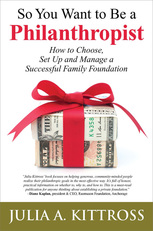 Playing Ultimate frisbee vs. attending the family foundation meeting? Playing Ultimate frisbee vs. attending the family foundation meeting? You may not be able to do anything but accept that fact. Just because the activity is a worthy one doesn’t mean that your children will find it (a) interesting, (b) something they are willing or able to make time for, or (c) turn them into mini-philanthropists in their own right. And if wails of "Mom always liked you best!" echo through the hallways at family gatherings now, don't expect that to change just because this is a "good deed" activity. I've worked with dozens of donors who set up their foundation with the primary goal of forcing, er, providing an opportunity for their children to work together in order to build strong family bonds. It's not always that simple. There are several things that can help. Most of them require that you, the donor, cede decision-making power to your children. Yes, I know that can be difficult for donors. But if your children's involvement is most important to you, it's a step that must occur. First, if possible, bring on all your children. Showing favoritism can lead to major issues. Additionally, if the board of directors of the family foundation consists only of you, your spouse, your long-time financial advisor and and your attorney, asking an 18 year old or even a 30 year old to hold their own in a discussion among such old fuddy-duddies is asking a lot — unless you provide them with a cohort that can amplify their voice. To address this try to bring on more than one younger generation trustee at a time. Second, be flexible.Your children (or grandchildren) are busy trying to get their start in life. And they may not have the ability to take time off work for a meeting during the week — or afford a babysitter for a weekend. Schedule the meetings to make it easier for their schedule rather than yours and if there are costs involved (travel, etc.) that are a hardship for them, consider covering their expenses. Third, be sensitive to the time crunch. Younger folks with children or exams have much less time available for outside the home activities. Allow them to take time off or elect to serve or not each year and still come back the following year. If board service becomes a burden and you make it clear that you believe your children aren't pulling their weight, you'll risk losing them completely from the foundation's activities. And you'll appreciate the leave policy when you need that hip replacement or long vacation! Lastly, jointly make a decision about how you'll make decisions. It is very common for everyone else on the board to defer to the matriarch or patriarch. Give the next generation an equal say in what the foundation funds, which criteria it uses to make choices, and how it evaluates its successes and failures. —Julia
1 Comment
 Everyone wants their investments to be successful and your desire for your charitable donations is no different. A common question asked by donors and trustees is, "How do I know I'm making a difference?" The best way to discover the answer to this is to answer a different question first: "What are you trying to accomplish with your family's foundation?" If you do want to practice effective — and rewarding — philanthropy, then answering that question is your first step. Some examples?
You get the idea.There are so many worthy goals.But the simple act of choosing a goal allows you to make all your following decisions so much easier and it gives you a chance to achieve something worthwhile. I’m going to let you in on a secret.Unless you are giving millions of dollars and pay for double blind longitudinal evaluations, you can’t truly know you’re making a difference. But don’t give up! There are many ways you can use proxy data to help guide your giving decisions to increase the odds of effectiveness. How?  I want to be a philanthropic…how do I start? Congratulations! Giving to your community is a worthy goal. You know, you've already likely achieved that goal. Do you volunteer at your local food bank? Give to your church, synagogue, mosque, meeting house, etc? Serve on the board of a local non-profit organization? Call yourself a philanthropist or good citizen, or nice person? If you're talking about making donations in a thoughtful and organized manner, there are many ways to do so. The easiest? Writing checks to the nonprofits you care about. Yes, there are structures out there that sound more "official," such as a donor- advised fund or a private foundation. And you may want to look into the pros and cons of these entities. But in each of these choices (and there are others), you start the same way. Answer the question: “What am I trying to accomplish?” Well, (I hear you say), “I already told you. I want to be philanthropic.” May I suggest that you go beyond this to wanting to be effective with your philanthropy? If you don't want to, then you should keep doing what you're already doing and stop reading this. You don't need me. If you do want to practice effective — and rewarding — philanthropy, then answering that question is your first step. Some examples?
You get the idea. There are so many worthy goals. But the simple act of choosing a goal allows you to make all your following decisions so much easier and it gives you a chance to achieve something worthwhile. —Julia  Help! My brother, sister, cousin, uncle, parents, grandparents, kids drive me crazy at our foundation meetings! I've seen it all. Brothers walking out in anger. Children feeling disenfranchised and depressed. Parents wanting to make all the decisions. Cousins wanting to quit if someone else doesn't. Why does this happen? Because family relationships are intense. They include long histories, differing generations, expectations, and responsibilities. You can avoid at least some of these problems by agreeing as a group how decisions will be made. Then, again as a group, develop decision-making criteria. Determine how much "homework" is needed, and who does it. Due diligence can be carried out by each member of the board, by certain members that have more time or expertise, or by someone you hire. Make sure everyone has a chance to talk at meetings. Create a set of rules that you post each time: For example, "No interruptions" or "Listen respectfully." For those who have a bad habit of interrupting, fine them $1 (or more!) to be collected for each interruption (use the money to pay for refreshments or add to a grant), or use a talking stick, or a carefully aimed Nerf® ball. (A former colleague of mine worked with a family foundation that placed their foam ball in a chalice in the board room!) Sometimes family dynamics become too difficult to handle and a dose of professional assistance may be needed. Foundations have split and families have developed schisms, all because people haven't agreed ahead of time what each trustee will do and how decisions will be made — and reviewed that process periodically to ensure it still works. —Julia  I will always tell you not to start a private foundation without a really good reason! Because the fact of the matter is that private foundations take a lot of work. First of all, each structure you choose has its accompanying required paperwork. Checkbook philanthropy requires that you keep a copy of your check and receipt for your taxes. Donor advised funds have set-up, investment and grants lists paperwork — but the entity in which you've created your DAF prepares these. Private foundations have to fill out tax returns, grant agreements, minutes, declination letters, investment and conflict of interest policies, application forms — and that's just for starters. No wonder you're drowning! First of all, identify which pieces of this work you actually enjoy (if any). Keep those. Then outsource the rest. It can be just that simple. Your attorney and investment advisors likely have policy templates. Hire a college or high school student to file papers and send out declination letters. Engage a consultant to draft guidelines, application forms, and other letters. Post a website — it can be done for free at the Foundation Center — and make sure your application information and deadlines are up to date and available to the public. Divide the tasks among your trustees or bring in the kids and grandchildren to do some of it. Hire or outsource your program officer and grant due diligence work. And most importantly, don't ask for more information from grant applicants than you actually use to make decisions! —Julia  You're sitting at your kitchen table sorting through several — or dozens — of letters of request or even full proposals for funding. They all fit your focus area. They all seem like good organizations. But you can't fund them all. How do you make a good decision? In a previous entry I noted that crafting a set of decision-making criteria would enable you to make better, more effective choices. Once you've done that, you can read each appeal with those criteria in mind. You value people learning to help themselves? Then look for an organization offering proven training programs with clear pathways out of poverty. You want to help kids be successful in school and in college? Consider how long an organization tracks its clients and how it determines success. Make sure that the students aren't sent off to college only with great fanfare but also with on-going support. You believe in evidence-based activities? Search for success indicators that indicate the organization uses evidence-based practices. You get the idea.  By mid-September 2013, So You Want to Be a Philanthropist will be available on Amazon. This lively, jam-packed book will allow those thinking about setting up a family foundation to ask the questions they should — before they do. And for those with a foundation that isn't functioning as they'd hoped, this book can help get you back on the right track. I'm excited about your reactions and look forward to hearing what you think! — Julia  On the evening of May 21st, a limited number of philanthropists will meet at the Threshold Group's invitation to hear Maggie Walker, Laurel Nesholm and Molly Hanlon (Walker Family Foundation, Nesholm Foundation and Hanlon Family Foundation respectively) have a conversation about the various ways they have engaged the next generation in their family's philanthropy. I'm delighted to facilitate this discussion about "Igniting the Full Potential of Your Family in Philanthropy" and if you'd like to attend, please contact Katrin Dietz at the Threshold Group at (206) 748-3695 or at [email protected]. —Julia  I have harped virtually all through this Blog on making mistakes. A 27-minute video made by the Communications Network showcases Susan Herr, president of PhilanthroMedia talking to Grant Olphant, president of the Pittsburgh Foundation in a conversation called 'What's the Upside of Failure?' It is worth a listen. Grant talks about specific 'mistakes' in his past and why saying "oops" is worthwhile. Susan also mentioned a new article, Philanthropy and Mistakes:An untapped resource by Robert Giloth and Susan Gerwirtz of the Annie E. Casey Foundation. It identified several types of common mistakes:
The article also briefly describes a few case studies about foundation failures, one that discusses the "dangers of outcome measures". Cheers to oops! —Julia  One of my favorite philanthropy blogs is Albert Ruesga’s White Courtesy Telephone: News, Opinions and Commentary from Inside the Third Sector. My commitment to this blog may be partially due to the fact that I’ve known Albert for many years (currently he is President & CEO of the Greater New Orleans Community Foundation), but mostly it’s because I appreciate his sense of humor and his insights. An entry about social justice philanthropy (“what’s your favorite shade of pinko?”) has a short paragraph describing how social justice philanthropy can vary: “Our work in social justice philanthropy will differ primarily along five axes: (1) our definition of social justice, (2) our goals, (3) our analysis of the problem we choose to address, (4) our choice of strategy and tactics, and (5) the values that animate our work.” This list of five axes could apply to grantmaking about any issue or from any construct. As a grantmaker, you should ask yourself if you have thoroughly thought out:
—Julia |
AuthorJulia Kittross: Archives
September 2017
Categories
All
|

Julia Kittross | Philanthropy Sherpas
[email protected] | www.PhilanthropySherpas.com | 206.334.7995
[email protected] | www.PhilanthropySherpas.com | 206.334.7995
 RSS Feed
RSS Feed